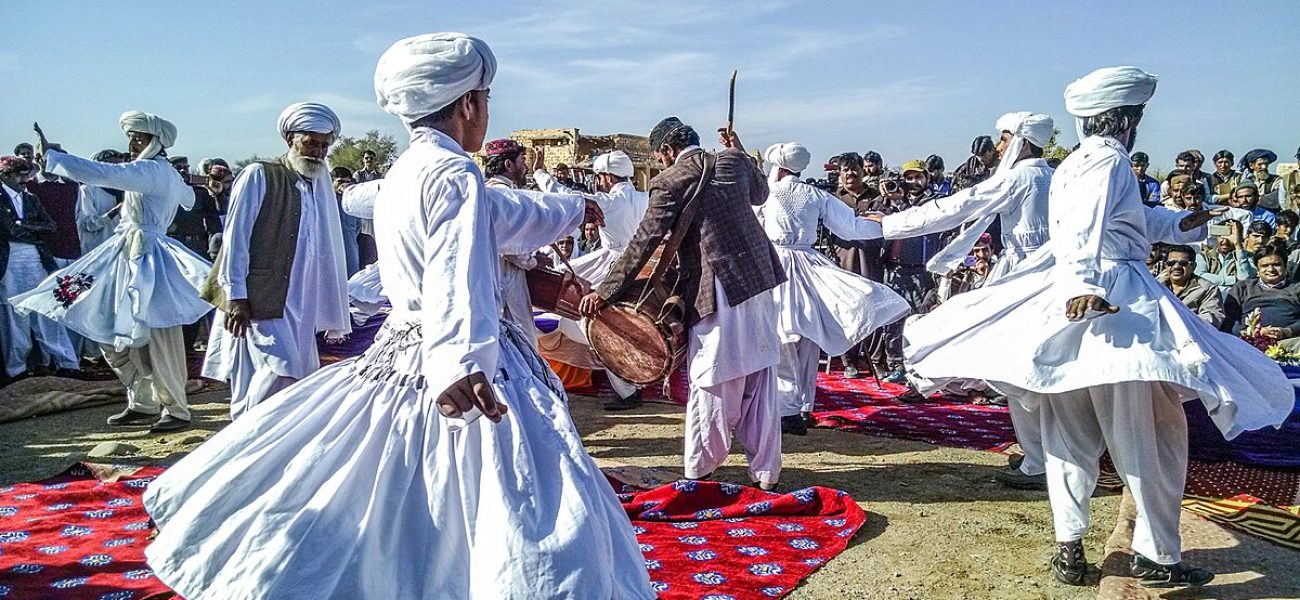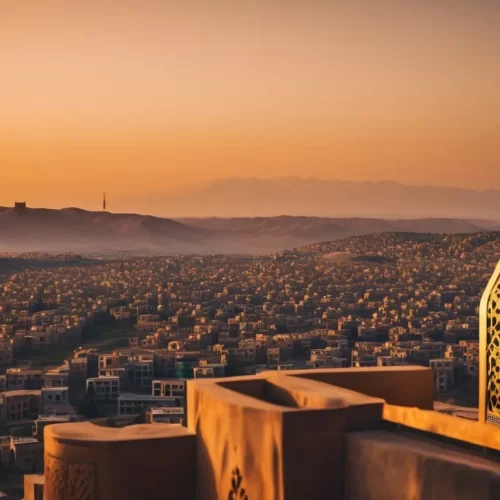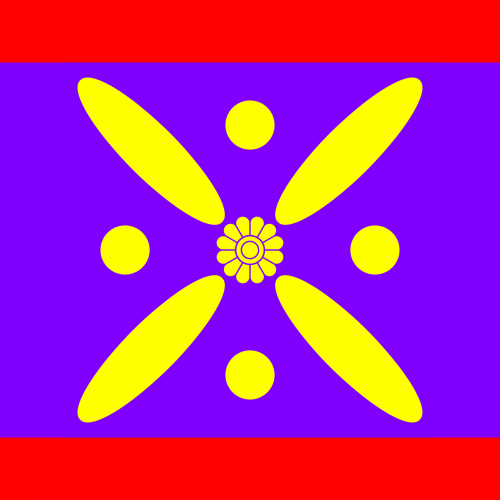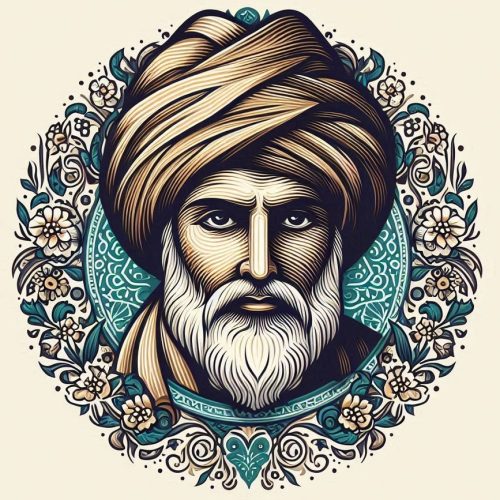The Baloch people, a vibrant and resilient ethnic group, inhabit the rugged and arid lands of Balochistan, spanning across present-day Iran, Pakistan, and Afghanistan. With a rich tapestry of history, culture, and tradition, the Baloch have carved a unique identity shaped by centuries of migration, conquests, and interactions with neighboring civilizations. In this research article, we embark on a journey to unravel the captivating story of the Baloch people, exploring their history, culture, tribes, traditions, and religious beliefs.
History of the Baloch People
The history of the Baloch people is a tapestry woven with threads of migration, conquests, and cultural exchange, spanning millennia of human civilization in the rugged terrain of Balochistan. While the exact origins of the Baloch people remain shrouded in mystery, historical evidence and oral traditions offer intriguing insights into their past.
Scholars and historians have proposed various theories regarding the origins of the Baloch people. Some suggest that they are descendants of ancient Iranian tribes who migrated from Central Asia to the region of Balochistan, while others posit connections to Arab, Turkic, and Dravidian ancestries. These theories reflect the diverse cultural influences and complex migratory patterns that have shaped the ethnic composition of the Baloch people over time.
The earliest historical references to the Baloch people date back to ancient Persian and Greek sources, which mention them as inhabitants of the region known as Gedrosia or Makran. They are described as a pastoral and semi-nomadic people, known for their resilience in the face of harsh environmental conditions and their prowess as warriors and horsemen.
Throughout antiquity, the land of Balochistan served as a crossroads of civilizations, with its strategic location linking the Indian subcontinent, Persia, and Central Asia. The Baloch people interacted with various ancient civilizations, including the Achaemenid, Mauryan, and Seleucid empires, contributing to a rich tapestry of cultural exchange and trade.
In the medieval period, the Baloch people emerged as a distinct ethnic group, consolidating their identity through a shared language, culture, and historical experience. They formed tribal confederations and alliances, such as the Rind, Lashari, Marri, Bugti, and Mengal tribes, which played a pivotal role in shaping the political landscape of Balochistan.
One of the defining chapters in Baloch history is the arrival of Islam in the region, which occurred through a combination of conquest, migration, and missionary activity. The spread of Islam transformed Baloch society, influencing its religious beliefs, cultural practices, and political organization. Over time, Sunni Islam, particularly the Hanafi school of thought, became the dominant faith among the Baloch people, shaping their religious identity and worldview.
In the modern era, the Baloch people have confronted numerous challenges, including foreign invasions, colonial rule, and internal conflicts. Despite these challenges, they have preserved their cultural heritage and traditions, drawing strength from their shared history and collective resilience.
Today, the Baloch people continue to assert their identity and rights in the face of geopolitical pressures and economic disparities. They strive to preserve their cultural heritage, protect their ancestral lands, and secure a better future for generations to come. As they navigate the complexities of the modern world, the Baloch people remain steadfast in their commitment to preserving their unique identity and promoting peace, prosperity, and justice in Balochistan and beyond.
Baloch Culture
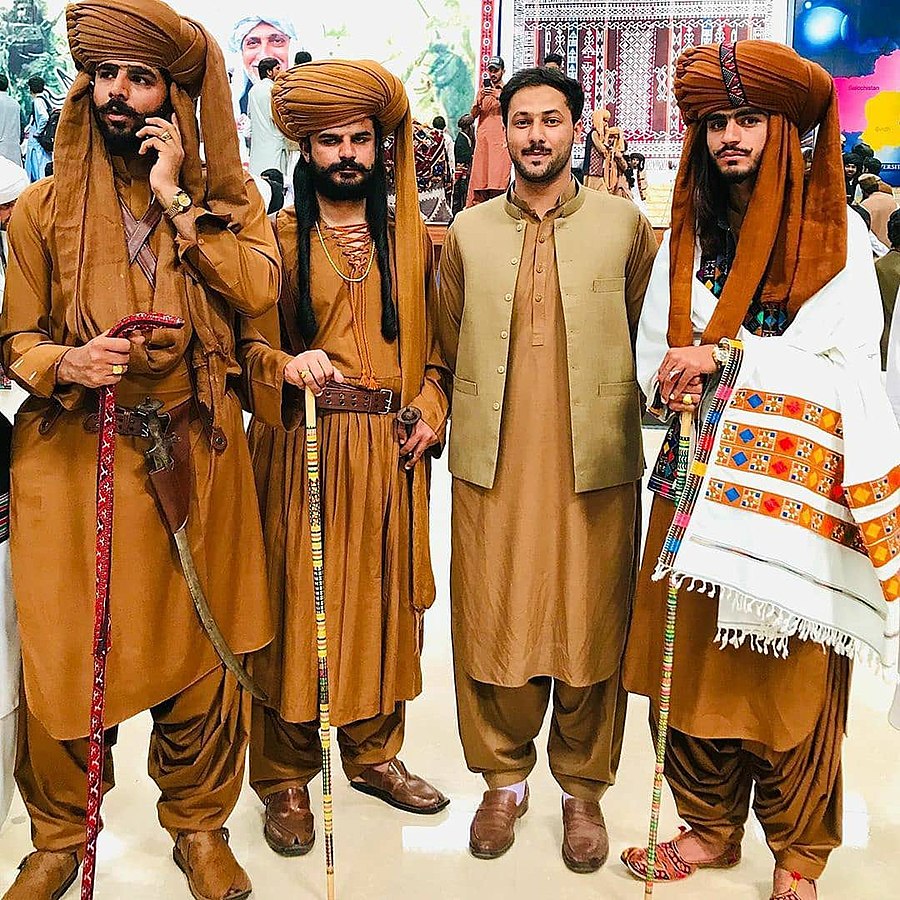
Baloch culture is a vibrant tapestry woven with traditions, customs, arts, and social norms that have evolved over centuries in the rugged terrain of Balochistan. It reflects the resilience, ingenuity, and deep-rooted connection of the Baloch people to their land, history, and heritage. Here, we delve deeper into the multifaceted aspects of Baloch culture:
Oral Traditions and Literature
Oral traditions form the cornerstone of Baloch culture, serving as a repository of collective memory, wisdom, and identity. Balochi folklore, myths, and epic tales, passed down through generations via storytelling and poetry, celebrate the valor of legendary heroes, recount the exploits of tribal chiefs, and evoke the beauty of Balochistan’s landscapes. Balochi poetry, characterized by its lyrical beauty and emotive expression, holds a revered place in Baloch culture, with poets revered as custodians of the Balochi language and guardians of its rich literary heritage.
Music and Dance
Music and dance are integral components of Baloch cultural expression, serving as means of celebration, social cohesion, and artistic expression. Balochi music is characterized by its haunting melodies, rhythmic beats, and soul-stirring lyrics, reflecting themes of love, longing, and resilience. Instruments such as the sorud (a stringed instrument), dohol (a drum), and zurna (a wind instrument) feature prominently in Balochi music, accompanying singers and dancers as they perform traditional dances such as the lewa and chap.
Art and Craftsmanship
Baloch artisans are renowned for their exquisite craftsmanship and intricate designs, which are evident in a variety of traditional arts and crafts. Balochi embroidery, known as “suzani,” features geometric patterns and vibrant colors, adorning clothing, textiles, and home furnishings with intricate motifs that reflect Balochi identity and cultural pride. Rug weaving is another cherished art form in Baloch culture, with Balochi carpets prized for their durability, beauty, and intricate designs that incorporate symbols of nature, animals, and tribal motifs.
Nomadic Lifestyle
The nomadic lifestyle has long been an integral part of Baloch culture, with many Baloch tribes traditionally practicing transhumance, migrating seasonally with their herds of livestock in search of pasture and water. This nomadic way of life has fostered a deep connection to the land and a strong sense of communal solidarity among Baloch tribes, as families work together to navigate the challenges of nomadic existence and preserve their traditional way of life.
Cuisine
Baloch cuisine reflects the region’s diverse culinary heritage, drawing inspiration from its nomadic past, as well as its coastal and desert landscapes. Staple foods such as wheat, barley, and rice form the basis of many Balochi dishes, which are often prepared using traditional cooking methods such as roasting, grilling, and stewing. Meat dishes, including lamb, goat, and camel, feature prominently in Baloch cuisine, flavored with aromatic spices, herbs, and seasonings. Flatbreads, such as “roti” and “naan,” are commonly served alongside savory dishes, while dairy products such as yogurt and cheese provide essential nourishment in the Baloch diet.
Baloch culture is a vibrant tapestry of traditions, arts, and customs that reflect the rich heritage and unique identity of the Baloch people. From their oral traditions and literary legacy to their music, dance, and craftsmanship, Baloch culture embodies the resilience, creativity, and enduring spirit of a people deeply connected to their land and heritage.
Baloch Tribes
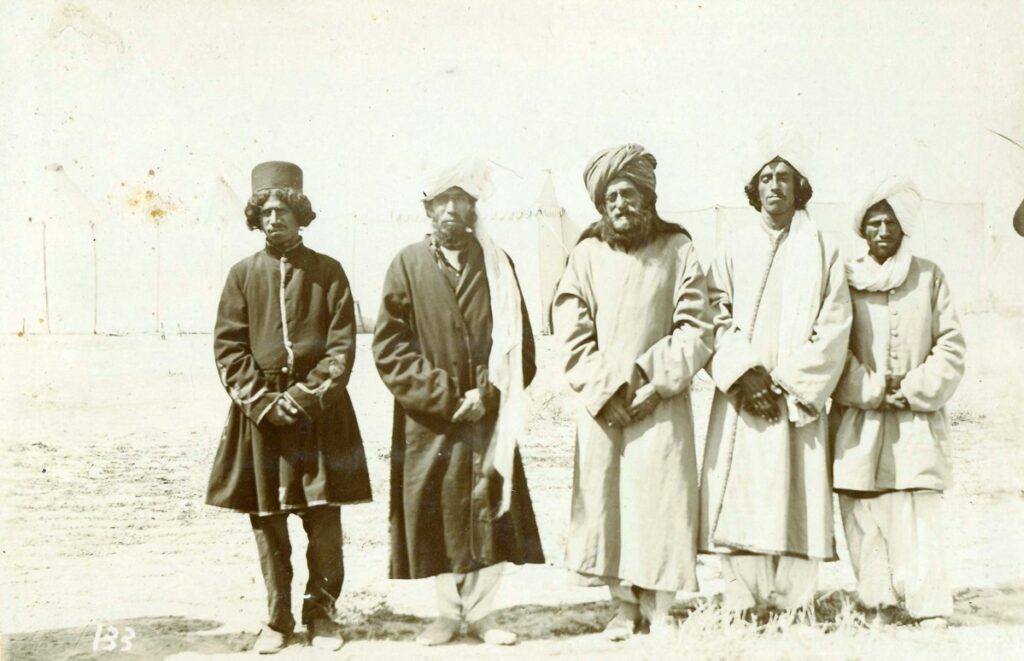
The Baloch people are organized into numerous tribes and sub-tribes, each with its own distinct lineage, customs, and territories. Prominent Baloch tribes include the Rind, Lashari, Marri, Bugti, and Mengal, among others, each tracing its ancestry back to legendary tribal leaders and founders. Let’s delve deeper into the characteristics and significance of some of these prominent Baloch tribes:
Rind Tribe
The Rind tribe is one of the largest and most influential Baloch tribes, with a storied history and a vast territorial presence across Balochistan. The Rind tribe traces its lineage back to Mir Chakar Khan Rind, a legendary Baloch warrior and tribal leader known for his bravery, leadership, and resistance against external invaders. The Rind tribe is renowned for its martial traditions, with its members historically serving as warriors, chieftains, and guardians of Balochistan’s rugged frontier regions.
Lashari Tribe
The Lashari tribe is another prominent Baloch tribe, known for its resilience, resourcefulness, and cultural contributions to Balochistan. The Lashari tribe traces its ancestry back to Lashar Khan, a revered tribal leader and progenitor of the tribe. The Lashari tribe is renowned for its expertise in agriculture, animal husbandry, and pastoralism, with its members traditionally occupying fertile lands and grazing grounds in Balochistan’s central and southern regions.
Marri Tribe
The Marri tribe is one of the largest and most powerful Baloch tribes, with a rich heritage and a deep-rooted connection to the land of Balochistan. The Marri tribe traces its lineage back to Mir Chakar Khan Marri, a legendary Baloch leader and freedom fighter who led numerous uprisings against external invaders and colonial powers. The Marri tribe is renowned for its strong sense of tribal solidarity, with its members traditionally standing united in the face of adversity and external threats to their autonomy and way of life.
Bugti Tribe
The Bugti tribe is one of the most prominent and influential Baloch tribes, with a long history of resistance, resilience, and territorial sovereignty in Balochistan. The Bugti tribe traces its ancestry back to Nawab Akbar Khan Bugti, a revered tribal leader and statesman known for his leadership, diplomacy, and advocacy for Baloch rights. The Bugti tribe is renowned for its martial prowess, with its members historically serving as warriors, defenders, and protectors of Balochistan’s rugged frontier regions.
Mengal Tribe
The Mengal tribe is one of the oldest and most respected Baloch tribes, with a rich heritage and a strong presence in Balochistan’s political and social landscape. The Mengal tribe traces its lineage back to Mir Jumma Khan Mengal, a legendary Baloch leader and tribal chief known for his wisdom, integrity, and commitment to the welfare of his people. The Mengal tribe is renowned for its strong sense of community, with its members traditionally prioritizing collective interests and solidarity over individual pursuits.
The Baloch tribes play a vital role in the social, cultural, and political fabric of Balochistan, serving as guardians of tradition, custodians of ancestral lands, and defenders of Baloch identity and autonomy. Despite their diverse lineages and territorial affiliations, Baloch tribes share a common bond forged by shared history, cultural heritage, and collective aspirations for a better future for their people and their homeland.
Tradition and Religion
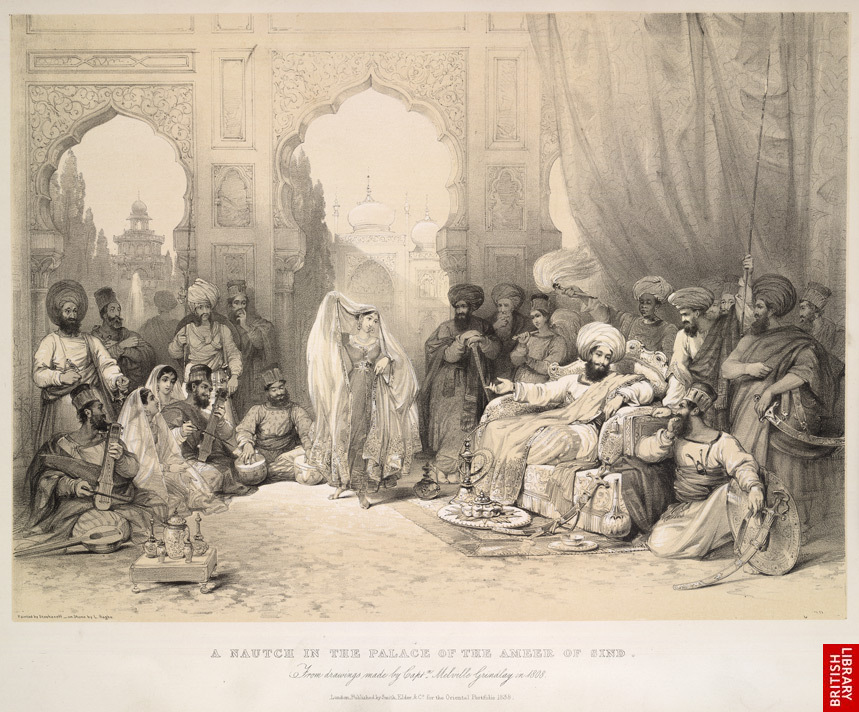
Tribal Customs and Social Norms
Tradition plays a significant role in Baloch society, shaping social norms, customs, and rituals that govern various aspects of daily life. Baloch traditions are deeply rooted in the values of honor, hospitality, and solidarity, which form the bedrock of Baloch social cohesion and identity. Respect for elders, loyalty to one’s tribe, and adherence to customary laws known as “Riwaj” are integral to Baloch culture, guiding interactions within families, communities, and tribal networks. Baloch tribal customs encompass a wide range of practices, including traditional greetings, ceremonies, and rites of passage that mark important milestones in the lives of individuals and communities.
Religious Beliefs and Practices
Religion holds a central place in Baloch culture, with the majority of Baloch people adhering to Sunni Islam, particularly the Hanafi school of thought. Islam was introduced to the region through a combination of conquest, migration, and missionary activity, gradually becoming the dominant faith among the Baloch people. Mosques, madrasas, and shrines serve as focal points of religious worship, education, and community gatherings, where Baloch Muslims gather to pray, study, and seek spiritual guidance. Islamic festivals and religious observances, such as Eid al-Fitr and Eid al-Adha, are celebrated with fervor and devotion, bringing families and communities together in prayer, feasting, and charitable acts.
Syncretic Traditions and Cultural Synthesis
While Islam is the predominant religion among the Baloch people, traditional beliefs and practices rooted in animism and ancestor worship continue to coexist alongside Islamic teachings, reflecting the syncretic nature of Baloch religious identity. Many Baloch communities incorporate elements of pre-Islamic rituals, superstitions, and folk traditions into their religious observances, blending ancient customs with Islamic principles in a cultural synthesis that reflects the diverse heritage of the Baloch people. Shrines dedicated to Sufi saints and spiritual leaders serve as sites of pilgrimage and veneration, where devotees seek blessings, healing, and divine intervention in their lives.
Role of Tribal Leaders and Religious Authorities
Tribal leaders, known as “sardars” or “khans,” often wield significant influence in matters of religion and tradition within Baloch communities. They serve as custodians of tribal customs, arbiters of disputes, and patrons of religious institutions, exercising authority and guidance over their respective tribes. Religious authorities, such as local mullahs and scholars, also play a vital role in interpreting religious texts, providing spiritual guidance, and disseminating religious knowledge within Baloch society. Their teachings and pronouncements help shape religious beliefs, ethical conduct, and social norms among the Baloch people, reinforcing the bonds of faith and tradition that unite them.
Tradition and religion are integral aspects of Baloch culture, shaping social interactions, moral values, and collective identity among the Baloch people. While Islam serves as the dominant religion, traditional customs, syncretic beliefs, and tribal traditions enrich the cultural tapestry of Baloch society, fostering a sense of continuity, belonging, and shared heritage among its diverse communities.
The Baloch people exemplify a rich tapestry of tradition and religious beliefs that are deeply intertwined with their social fabric and cultural identity. Through centuries of history, the Baloch have upheld their tribal customs, social norms, and religious practices, forging a unique cultural heritage that reflects resilience, adaptability, and a strong sense of community.
The tradition of the Baloch people serves as a testament to their collective memory and shared values, fostering a sense of belonging and solidarity within Baloch communities. From the intricate rituals of tribal ceremonies to the everyday interactions governed by customary laws, tradition plays a vital role in shaping Baloch society and preserving its distinct identity in the face of external pressures and modernization.
Religion, particularly Islam, forms the spiritual foundation of Baloch culture, providing guidance, solace, and a sense of moral direction to its adherents. Baloch Muslims draw inspiration from Islamic teachings, rituals, and values, while also incorporating elements of pre-Islamic traditions and syncretic beliefs into their religious practices. This fusion of faiths reflects the dynamic nature of Baloch religious identity, characterized by a reverence for tradition and a spirit of cultural synthesis.
As Baloch communities navigate the complexities of the modern world, they continue to draw strength from their rich heritage of tradition and religion, embracing the challenges of change while remaining rooted in their ancestral customs and spiritual beliefs. The resilience and adaptability of the Baloch people are evident in their ability to preserve and reinterpret their cultural legacy, ensuring its continuity for future generations to cherish and uphold.
In essence, tradition and religion are not just cultural artifacts for the Baloch people but living expressions of their collective identity and shared values. Through the preservation of their customs and the practice of their faith, the Baloch people affirm their resilience, dignity, and enduring connection to their land, history, and heritage.

